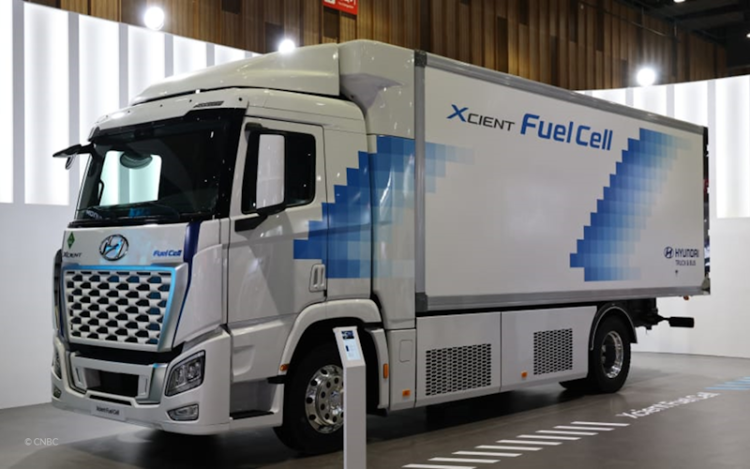Sustainability in fleet management: Transitioning to Alternative Fuel Vehicles
Explore how transitioning to Alternative Fuel Vehicles can enhance your fleet's sustainability with insights on cost savings, emissions reduction, and regulatory compliance featured in our ongoing series on sustainability in fleet management.

Following the success of our sustainability series’ first article – 8 Key Strategies for Sustainable Fleets - we now discuss the benefits and challenges of transitioning to alternative fuel vehicles (AFVs) and how to make it go smoothly.
AFVs become essential in sustainable fleet management as sustainability gains prominence across sectors. Companies are becoming more aware of their ecological footprint, making transitioning to cleaner fuel options crucial for reducing emissions and increasing efficiency. Electric vehicles (EVs) and other alternative fuel vehicles are also increasingly on companies' radars as they minimize the environmental impact of operations, produce fewer greenhouse gas emissions, conserve energy, and promote environmentally friendly practices.
Transitioning to Alternative Fuel Vehicles
For any company aiming for sustainability, the first step often involves acquiring alternative fuel vehicles and ensuring compliance with alternative fuel infrastructure regulations. However, this process can be challenging.
Key considerations for a smooth transition to Alternative Fuel Vehicles
Infrastructure planning
Effective infrastructure planning is essential for integrating AFVs. It involves installing sufficient charging stations for electric vehicles (EVs) and ensuring fueling options for other AFVs, such as Compresses Natural Gas (CNG) or hydrogen. Comprehensive planning helps prevent delays by aligning infrastructure with fleet needs, considering energy requirements, and integrating these solutions into existing operations. This approach supports overall sustainability goals.
Vehicle acquisition
Selecting sustainable vehicles is crucial for a successful transition to alternative fuel vehicles. Analyze your fleet's current composition and operational needs to identify which AFVs, such as EVs, fit best. Consider factors like:
- Vehicle range;
- Charging infrastructure availability;
- Total cost of ownership.
By carefully planning and aligning these elements, you will enhance sustainability and operational efficiency.
Temporary charging solutions
Temporary charging solutions are crucial when transitioning to alternative fuel vehicles, offering flexibility and ensuring continuous operations.
These solutions, such as mobile EV charging stations, can be installed almost anywhere, providing immediate charging capabilities while the permanent infrastructure is being developed. Many of these systems are designed to operate independently of the traditional electricity grid, using sustainable energy sources such as renewable propane.
What are the benefits of having sustainable fleets?
1. Mitigate climate change
Sustainable fleets play an important role in reducing greenhouse gas emissions from the transportation sector, thus protecting air quality and ecosystems. These fleets significantly lower their carbon footprint, reduce harmful pollutants, and contribute to broader climate change mitigation efforts while optimizing vehicle efficiency.
2. Provide cost savings
Fleets committed to sustainability benefit from improved fuel economy and reduced operational costs. Strategies like fleet right-sizing and route optimization further enhance these savings, leading to more efficient resource use and lower overall expenses.
3. Advocate modernization and electrification
Adopting cleaner technologies and electric vehicles (EVs) is central to modernizing fleets. This transition ensures long-term operational efficiency and positions the fleet at the forefront of industry innovation.
4. Ensure compliance with regulations
A sustainable fleet helps companies comply with strict emissions regulations, thus maintaining legal and operational standards. This compliance avoids unnecessary costs associated with penalties.
5. Enhance corporate social responsibility
By demonstrating environmental responsibility, sustainable fleets enhance a company's reputation. This commitment attracts eco-conscious customers and employees, reinforcing the organization's role as a responsible corporate citizen.
6. Resilient and prepared for the future
Sustainable fleets are designed to adapt to future regulatory and market changes, ensuring long-term sustainability. This proactive approach helps prevent disruptions and prepares the fleet for evolving industry demands.
7. Competitive advantage
Implementing sustainable fleet programs provides a competitive advantage by appealing to stakeholders who value environmental responsibility. This advantage helps organizations stand out and attract like-minded partners and customers.
The challenges when transitioning to AFVs
However, switching to alternative fuel vehicles (AFVs) also presents challenges, such as overcoming skepticism and financial concerns. Open communication and education about the benefits of AFVs are crucial to tackling this resistance. As for financial matters, it is essential to remember that effective management of electricity costs and optimizing energy use in the fleet will be necessary, particularly in areas with high electricity prices. Implementing intelligent energy management systems and collaborating with local utility providers can help fleets control costs and integrate EV infrastructure effectively.
Transitioning to alternative fuel vehicles is a strategic step towards a sustainable future. By embracing AFVs, fleets can significantly reduce their environmental impact, achieve cost savings, and gain a competitive advantage.
With Frotcom, you can monitor and control fuel/energy levels and consumption, including in EVs and natural gas vehicles. To know more, contact a member of our team today.
- Frotcom
- Alternative fuel vehicles
- AFVs (Alternative fuel vehicles)
- Duurzaam wagenparkbeheer
- Elektrische voertuigen
- Transitioning to AFVs
- Charging stations
- Vehicle acquisition
- Infrastructure planning
- Temporary charging solutions
- Climate change mitigation
- Fleet cost savings
- Fleet modernization
- Emissions regulations
- Corporate social responsibility
- Energy management systems
- Duurzaamheid van de vloot
- 4G for fleet management

